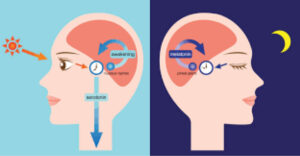While there is no doubt in the fact that the food we use to fuel our bodies is what determines how healthy we are, there is another lifestyle factor which plays a crucial role in your health. It’s almost tied to nutrition – SLEEP – a factor that is unfortunately oft overlooked. This article is dedicated to all who are committed to bettering your health in the New Year – especially for those who wish to better their quality of sleep. Which is why we need to start with an understanding of Melatonin – also called the sleep time hormone.
 What is Melatonin? Often discussed as a form of supplements, Melatonin is a hormone that is naturally produced by the body. Its main job is to regulate your sleep-wake cycle, in addition to taking care of your eye-health and immune system.
What is Melatonin? Often discussed as a form of supplements, Melatonin is a hormone that is naturally produced by the body. Its main job is to regulate your sleep-wake cycle, in addition to taking care of your eye-health and immune system.
Melatonin levels are the lowers in the morning, as opposed to the levels of Cortisol – the stress hormone, which spikes, in order to wake you up and that’s what pushes you out of bed. Through the day, melatonin levels gradually rise, and cortisol levels eventually lessen. When the sun goes down, melatonin levels surge, putting you to sleep. This cycle occurs daily, enabling you to move from alert (awake) mode to sleep mode, as the sun goes down.
Melatonin Imbalance: Chronic stress, excessive screen time, and not getting enough sun are common reasons that throw the melatonin cycle off track. One of the major culprits causing melatonin imbalance is adrenal fatigue, which occurs when your adrenal glands (located above your kidneys, responsible for producing stress hormones) get overworked. This lowers Melatonin levels when it should be high and vice versa. Have you ever felt like you could sleep for a straight ten hours in the afternoon, but when you hit the bed, you find yourself completely wired! This is what experiencing melatonin imbalance means! Since Melatonin does more than just regulate sleep, an imbalance can be more than just trouble getting a good night’s sleep. Melatonin is a powerful tool against inflammation. Melatonin imbalance can result in low immunity.
Here’s How Can You Boost Melatonin For Sleep:
Reduce Your Screen Time: The light emitted from all electronic gadgets, called blue light, sends false signals to your brain that it’s daylight. This inhibits melatonin production in the evenings when you should be calling off the day. Hence, to optimize melatonin production, you need to avoid screens before bed. Ideally, you must have a no-screen time routine at least 2 hours before your bedtime, which might not always be possible. But you could start with 30 minutes without staring at a TV, phone, or tablet – that will definitely help.
Bask In The Morning Sun As Soon As You’re Awake: Your body relies on cues from your environment to tell it what time it is. That’s why blue light in the evenings is such a problem and this is the reason why getting direct sunlight in the morning can be very helpful. By going outside in the first half of the day, as soon as you wake up, you’re sending your body an extremely strong signal that it’s now morning and you should feel awake and refreshed.
Say No To Light Pollution: Getting light in the morning is an excellent start but it does support melatonin, it’s best to make your nighttime environment completely dark, too. That means getting blackout curtains or blinds, covering up any clocks or devices that emit light, and trying to make it as dark as possible. People have had wonderful results with this!
What’s The Buzz About Melatonin Supplements?
You could think it would be so much easier to just take a melatonin supplement instead of jumping through all these lifestyle changes to support natural melatonin production. Truth is, though melatonin supplement is ‘natural’, it’s also a hormone which you will be taking in. Relying on an external melatonin supplement instead of the natural melatonin your body produces can cause confusion and alter the body’s ability to regulate your own melatonin production. And since the body is so interconnected, it may disrupt other hormones down the line.
So, if you’re looking for help with sleep, I recommend taking Magnesium Glycinate daily – it has a calming effect and promotes sleep without disrupting hormones. Of course, you could take melatonin supplements when you’re jet lagged (time-zone difference of 12+ hours) as travel through time zones can mess with your melatonin rhythms, and taking a melatonin supplement 2 hours before heading to sleep in your new location helps your body adjust quickly. Melatonin is commonly used by pilots who often travel through differing time-zones.
Melatonin is one of the most important hormones in your body. It’s always best to support natural melatonin production before opting for a supplement. The above tips will help get your melatonin balanced – it takes a total of 3 weeks for the above changes to help, but once done, this becomes permanent! Hope you all jump into the New Year with great quality sleep! Happy New Year!!
- Beat The Winter Sniffles - 23 November2024
- The Sweet Shift: Diwali Sweets And The Rise Of Sugar-Free Alternatives - 26 October2024
- Hormones And Happiness - 10 August2024
